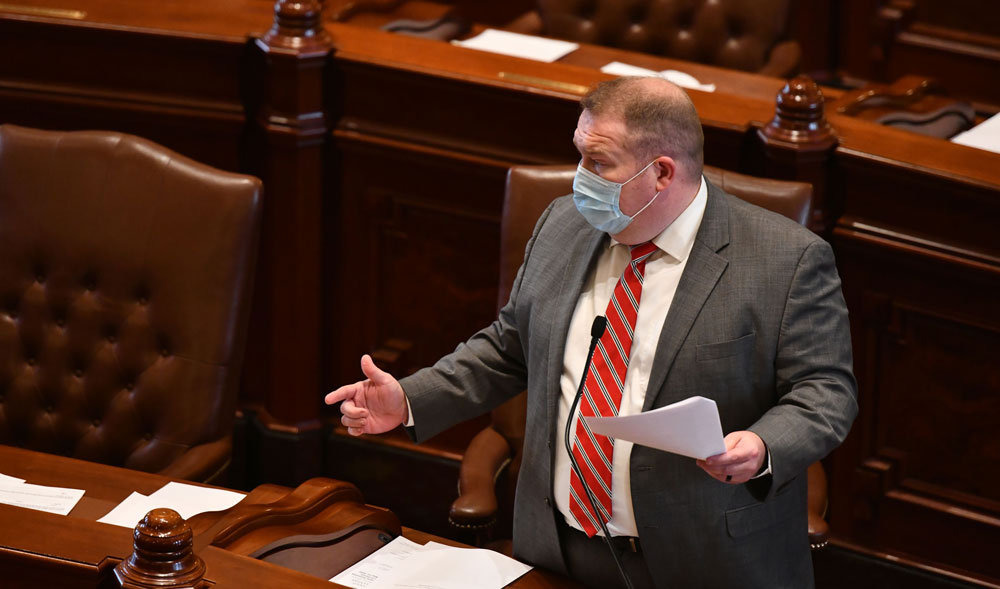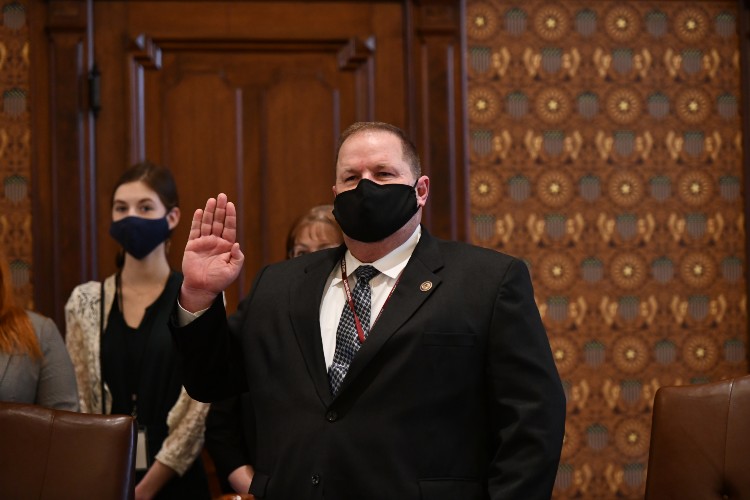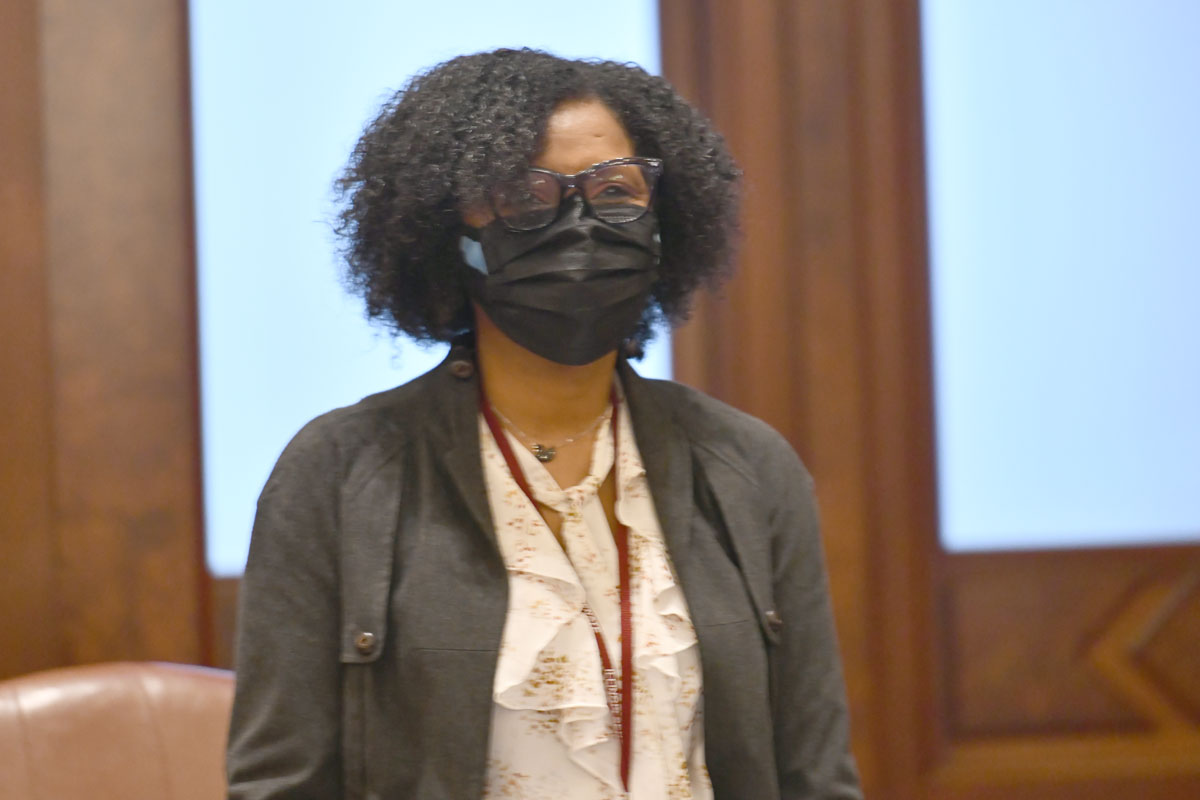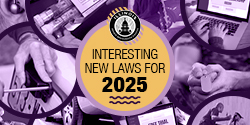- Details
- Category: Senator Jacqueline Y. Collins News
 CHICAGO – In light of reports showing familiar disparities in ongoing COVID-19 vaccination efforts between Chicago’s well-to-do communities and majority-minority communities, State Senator Jacqueline Collins called on Gov. Pritzker Monday to focus resources on the same neighborhoods that are suffering from the highest rates of infection and death but are to date seeing the slowest rollout of the vaccines.
CHICAGO – In light of reports showing familiar disparities in ongoing COVID-19 vaccination efforts between Chicago’s well-to-do communities and majority-minority communities, State Senator Jacqueline Collins called on Gov. Pritzker Monday to focus resources on the same neighborhoods that are suffering from the highest rates of infection and death but are to date seeing the slowest rollout of the vaccines.
“When the pandemic began, we saw disparities in infections and deaths,” Collins said. “As it continued, we saw disparities in testing and care. Now, we are seeing disparities in reaching the light at the end of the tunnel. These disparities are literally killing us. I am calling on Gov. Pritzker to interrogate the reasons that the most affluent North Side ZIP codes are seeing such success in vaccination while impoverished communities like mine are struggling, even as we’re seeing the worst rates of spread. And I am calling on him to do something about it.”
A recent report from the Chicago Tribune showed vaccination rates in areas of the city such as the Magnificent Mile and Wicker Park have been relatively high, while rates in areas like Englewood have been much lower. Early data indicates white Chicagoans are twice as likely to receive the vaccine as other groups, the Tribune reported. The Associated Press also reports that the disparity is hardly unique to Chicago.
Another report out yesterday shows the same neighborhoods that have dealt with long-term issues such as pollution are also struggling to get a place in line for vaccinations.
“The governor moved to rectify testing disparities in the Auburn Gresham area when we pointed them out, and now it is home to the city’s state-run, free testing site,” Collins said. “I am again calling on him to recognize that a more targeted effort is needed to immunize the communities where this virus has struck the hardest.”
- Details
- Category: Senator Scott Bennett News
 CHAMPAIGN – State Senator Scott Bennett (D-Champaign) will serve as chair of the Senate Higher Education Committee in the 102nd General Assembly.
CHAMPAIGN – State Senator Scott Bennett (D-Champaign) will serve as chair of the Senate Higher Education Committee in the 102nd General Assembly.
“I’m honored to have been appointed as chair of the Senate Higher Education Committee,” Bennett said. “Higher education in all forms is vital for the workforce and economy, and I’m eager to serve in this new role.”
The Senate Higher Education Committee primarily deals with legislation and policy that will affect both state and private institutions.
Bennett is a longtime advocate for higher education institutions and has worked on legislation to provide opportunities for all students to find a path towards a secondary education. The district Bennett represents includes the University of Illinois, Parkland College and Danville Area Community College, which has given him a deep understanding of the needs of Illinois schools, staff and students, as well as their surrounding communities.
As committee chair, Bennett aims to create an equitable, accessible and innovative higher education ecosystem across Illinois that ensures students and communities thrive.
Bennett has previously served as chair of the Senate Agriculture Committee and Senate Criminal Law Committee.
- Details
- Category: Senator Patrick Joyce News
 PARK FOREST – With temperatures dropping and more people staying indoors, State Senator Patrick Joyce (D-Essex) joins the Office of the State Fire Marshal in reminding residents to have their furnaces checked, change furnace filters and make sure carbon monoxide and smoke detectors are functioning properly.
PARK FOREST – With temperatures dropping and more people staying indoors, State Senator Patrick Joyce (D-Essex) joins the Office of the State Fire Marshal in reminding residents to have their furnaces checked, change furnace filters and make sure carbon monoxide and smoke detectors are functioning properly.
“With many people working remotely due to COVID-19, thermostats are turned up all hours of the day,” Joyce said. “I encourage homeowners to make sure they are heating their homes safely to keep their families and loved ones safe this winter.”
From 2012-2016, U.S. fire departments responded to an average of 52,050 fires each year involving heating equipment, accounting for 15% of all reported home fires during that time. Half of heating-related fires are reported during December, January and February.
It’s not just fires that pose a danger during these cold months. Carbon monoxide is a colorless, odorless gas that is only detectable by special detectors and alarms. These alarms, just like smoke alarms, need to be tested monthly to ensure they are working properly.
Symptoms of carbon monoxide poisoning include headache, fatigue, shortness of breath, nausea and dizziness. If you are experiencing these symptoms, if you smell natural gas leaking in your home, or if your carbon monoxide alarm activates, evacuate the home immediately and open windows on the way out, if possible.
The Illinois Office of the State Fire Marshal recommends homeowners keep these tips in mind when it comes to winter heating safety:
- Have heating equipment and chimneys cleaned and inspected every year by a qualified professional.
- Change furnace filters frequently.
- Keep interior and exterior air vents clear of blockages or obstructions.
- Keep anything that can burn at least three feet away from heating equipment, like a furnace, fireplace, wood stove or portable space heater.
- Test smoke and carbon monoxide alarms at least once a month and be familiar with the sounds they make.
- Install carbon monoxide and smoke detectors on each floor of your home and within 15 feet of each sleeping area.
Check the manufacturer’s instructions for information on replacement of carbon monoxide and smoke detectors.
For more tips and information on winter heating safety, visit the Illinois Office of the State Fire Marshal website here.
- Details
- Category: Senator Adriane Johnson News
 BUFFALO GROVE – State Senator Adriane Johnson is encouraging students from underrepresented communities who want to pursue a degree in science, technology, engineering or math to apply for the Future of STEM Scholars Initiative.
BUFFALO GROVE – State Senator Adriane Johnson is encouraging students from underrepresented communities who want to pursue a degree in science, technology, engineering or math to apply for the Future of STEM Scholars Initiative.
“Underrepresented groups should have the opportunity to enter and succeed in science and math-based careers,” Johnson said. “College is expensive and seems like a daunting and unlikely possibility for many minority students. I hope this scholarship will give young people from our communities the chance they’ve always dreamed of.”
The Future of STEM Scholars initiative will provide a total of $40,000 to each awarded student, which would be paid at a rate of $10,000 per year. Additionally, the students would receive internship preparation and placement, leadership training and access to mentorship opportunities.
Students who will graduate with at least a 3.0 GPA this year and plan to major in a STEM-related field at a historically black college or university are eligible. Areas of STEM include, but are not limited to, computer science, chemical engineering and biology.
The collaborative equity, diversity and inclusion initiative was spearheaded by the American Chemistry Council along with the American Institute of Chemical Engineers, The Chemours Company and the Historically Black Colleges and Universities Week Foundation.
Applications are due Feb. 15. For more information and to apply, students can visit the scholarships tab on the Historically Black Colleges or Universities Week Foundation’s website.
- Details
- Category: Senator Napoleon Harris III News
 DOLTON - As winter weather continues to reach freezing temperatures, State Senator Napoleon Harris, III (D-Harvey) reminds homeowners to check their home heating and alarm devices to make sure they are still functioning properly.
DOLTON - As winter weather continues to reach freezing temperatures, State Senator Napoleon Harris, III (D-Harvey) reminds homeowners to check their home heating and alarm devices to make sure they are still functioning properly.
“A proper home inspection is critical in ensuring your home is equipped with the quality heating it needs to fight off the coldness of our winter season,” Harris said. “However, it is also important to check your furnace, furnace filter and smoke detectors to ensure your family is safe from potential fires.”
Read more: Harris reminds homeowners to do a utility equipment check
- Details
- Category: Senator Robert Martwick News
 CHICAGO – Temperatures outside are falling quickly, and State Senator Robert Martwick (D-Chicago) is encouraging homeowners to check that their heaters are in working order, as well as their carbon monoxide and smoke detectors.
CHICAGO – Temperatures outside are falling quickly, and State Senator Robert Martwick (D-Chicago) is encouraging homeowners to check that their heaters are in working order, as well as their carbon monoxide and smoke detectors.
“Take a few minutes out of your day to check the air filters in your furnace and smoke detectors in your home,” Martwick said. “Many fires are started around faulty heating equipment in the home, and I recommend following proper safety practices to keep you and your family safe this winter.”
Between 2012 and 2016, U.S. fire departments responded to an average of 52,050 fires each year involving heating equipment, accounting for 15% of all reported home fires during that time. Half of heating-related fires are reported during December, January and February.
It’s not just fires that pose a danger during these cold months. Carbon monoxide is a colorless, odorless gas that is only detectable by special detectors and alarms. These alarms, just like smoke alarms, need to be tested monthly to ensure they are working properly.
Symptoms of carbon monoxide poisoning include headache, fatigue, shortness of breath, nausea and dizziness. If you are experiencing these symptoms, if you smell natural gas leaking in your home, or if your carbon monoxide alarm activates, evacuate the home immediately and open windows on the way out, if possible.
The Illinois Office of the State Fire Marshal recommends homeowners keep these tips in mind when it comes to winter heating safety:
- Have heating equipment and chimneys cleaned and inspected every year by a qualified professional.
- Change furnace filters frequently.
- Keep interior and exterior air vents clear of blockages or obstructions.
- Keep anything that can burn at least three feet away from heating equipment, like a furnace, fireplace, wood stove or portable space heater.
- Test smoke and carbon monoxide alarms at least once a month and be familiar with the sounds they make.
- Install carbon monoxide and smoke detectors on each floor of your home and within 15 feet of each sleeping area.
- Check the manufacturer’s instructions for information on replacement of carbon monoxide and smoke detectors.
For more tips and information on winter heating safety, visit the Illinois Office of the State Fire Marshal website.
- Details
- Category: Senator Sara Feigenholtz News
 CHICAGO – State Senators Sara Feigenholtz (D-Chicago), Robert Martwick (D-Chicago) and Robert Peters (D-Chicago) and State Representatives Ann Williams (D-Chicago) and Margaret Croke (D-Chicago) are hosting a town hall to discuss House Bill 3653, the criminal justice package that was passed earlier this month.
CHICAGO – State Senators Sara Feigenholtz (D-Chicago), Robert Martwick (D-Chicago) and Robert Peters (D-Chicago) and State Representatives Ann Williams (D-Chicago) and Margaret Croke (D-Chicago) are hosting a town hall to discuss House Bill 3653, the criminal justice package that was passed earlier this month.
“Fact vs. Fiction: What the Criminal Justice Bill Does and Doesn’t Do” will feature three panelists who will discuss some myths circulating about the bill in an attempt to clear up some of the misinformation that is being spread.
The town hall will take place virtually via Zoom at noon on Tues., Feb. 2, and will last approximately one hour. Residents are encouraged to submit questions.
RSVP is required, but there is no limit to the number of spots. The Zoom link will be sent the morning of the event to those who have RSVP’d. To RSVP and submit a question or comment, click here.
WHO: State Sen. Sara Feigenholtz (host)
State Sen. Robert Martwick (host)
State Sen. Robert Peters (host)
State Rep. Ann Williams (host)
State Rep. Margaret Croke (host)
State Sen. Elgie Sims (panelist)
States Attorney Eric Reinhart (panelist)
Director Sean Smoot, Council for the Police Benevolent & Protective Association (panelist)
WHAT: Town hall on House Bill 3653, the criminal justice package
WHEN: Tues., Feb. 2, 2021 from 12 p.m. to 1 p.m.
WHERE: Virtual via Zoom (link to be provided morning of event)
- Details
- Category: Senator Julie A. Morrison News
 HIGHWOOD – State Senator Julie Morrison (D- Lake Forest) is urging current and former youth under the care of the Illinois Department of Children and Family Services to apply for the 2021 DCFS Scholarship Program.
HIGHWOOD – State Senator Julie Morrison (D- Lake Forest) is urging current and former youth under the care of the Illinois Department of Children and Family Services to apply for the 2021 DCFS Scholarship Program.
“Furthering education can open so many doors for children, especially our most vulnerable youth,” said Morrison, who has been a steadfast advocate for funding and resources for DCFS. “This scholarship opportunity can give students the tools they need to succeed in higher education, so I urge anyone who can to apply.”
The DCFS Scholarship Program is open to youth who have an open DCFS case, whose cases were closed through adoption or guardianship, or who aged out of care at 18 or older. Youth who are at least 16 years old and not yet 21 on March 31 may apply. The program will award 53 academic scholarships in total.
Scholarship recipients are selected based on their scholastic record, community and extracurricular activities, letters of recommendation and a written personal statement. Recipients will receive up to five consecutive years of tuition and academic fee waivers to be used at participating Illinois state community colleges and universities, a monthly grant of $1,235 to offset other expenses and a medical card.
“This scholarship can alleviate the stress many students feel when transitioning into college, and allow students to focus on their education instead of worrying about how they will be able to pay for school,” Morrison said.
Applications are due by March 31. More information and the application are available at any DCFS regional office and on the DCFS website under DCFS Features on the homepage.
Students or caregivers may also call the DCFS Office of Education and Transition Services at 217-557-2689 with questions about the application process or for more information.
More Articles …
Page 527 of 728












 © 2025 Illinois Senate Democratic Caucus
© 2025 Illinois Senate Democratic Caucus